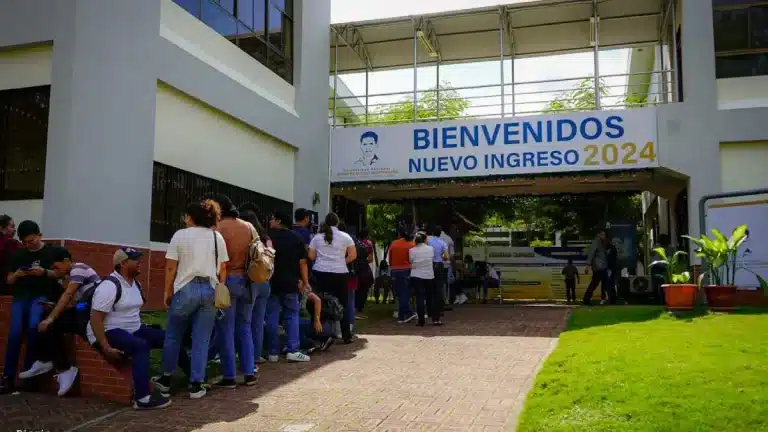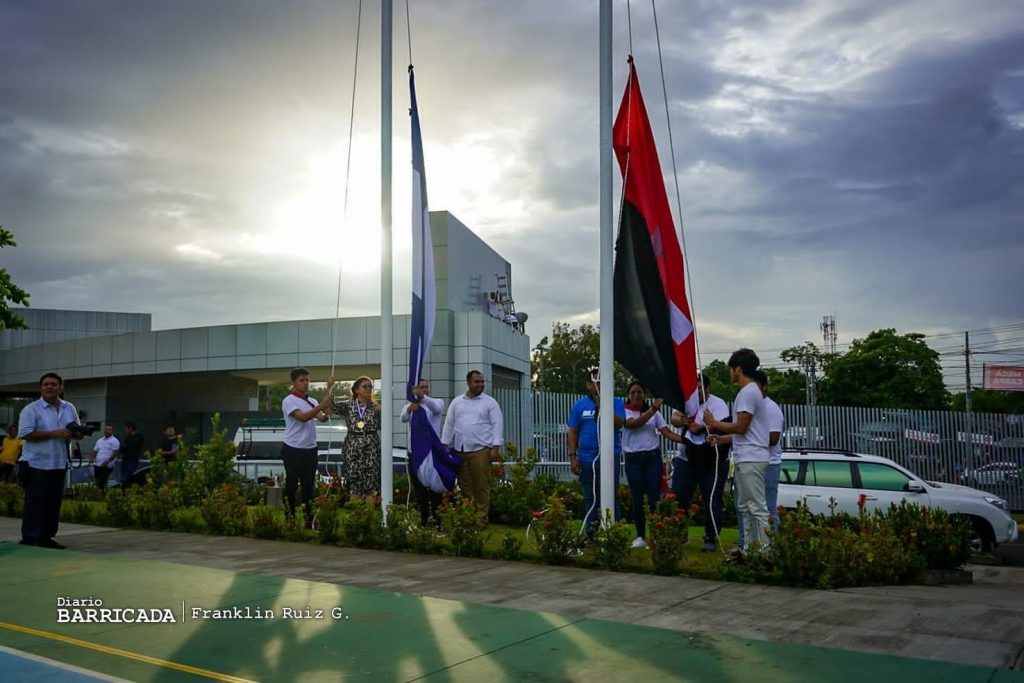13 de enero 2024

“NicaraguAmor” Cultural Caravan for Nicaraguans in the USA

PUBLICIDAD 1M
PUBLICIDAD 4D
PUBLICIDAD 5D
Over 1,200 teachers were fired from confiscated universities. Others would rather look for other jobs or emigrate instead of politically indoctrinating

Luis knew that the time had come to leave the classroom following the closing and confiscation of the Central American University (UCA), ordered by the Ortega dictatorship in mid-August 2023.
The professor is not sure if it’s a definitive retirement, but he does know that he will not return while the regime remains in power.
“I have already retired from academia. I gave it up for lost,” he says emphatically.
The professor, with more than ten years of university experience, feels hopeless about the higher education crisis in Nicaragua. In addition to the UCA, 26 other universities have been closed and confiscated between December 2021 and August 2023. Following the theft of the higher education institutions, the dictatorship has imposed the partisan indoctrination of the Sandinista Front.
Luis argues that he is not willing to teach under the administration of FSLN political operators, falsely described as “academics.” He prefers to take up another profession or migrate.
It took the Ortega dictatorship four months to resume the functionality of the confiscated UCA campus, renamed the Casimiro Sotelo National University. Its plan included the dismissal of 710 professionals, of which 418 were teachers and 292 worked in other areas.
At the Universidad de Occidente (UDO), also confiscated, another 115 teachers were left unemployed and at the Universidad Evangélica Nicaragüense Martin Luther King (UENIC-MLK), taken over by the regime, 207 teachers were put out of work.
In total, more than 1200 people working in these three universities became unemployed, according to the 2022 statistical yearbook, published by the National Council of Universities (CNU), in December.
The removal of teaching and administrative staff from the UCA and other universities had been forewarned by education expert, Ernesto Medina, who assured that the regime would surely review student and teacher files and that many of them would not be able to continue at the UCA. “I am afraid that many professors, in the current conditions of the university, are not willing to work either,” added Medina.

Karla has 14 years of academic experience in Nicaragua. She was a permanent professor when the Ortega regime confiscated the Polytechnic University of Nicaragua (Upoli), and created the National Polytechnic University (UPN). “It was a day of great uncertainty. I didn't know what was going to happen,” she recalls.
A few days after the takeover of that institution of higher education, which had been a university bastion during the civic protests of 2018, they summoned all the teachers to explain that the university was going through a "process of extinction." They were informed that the administration had changed, but that they would guarantee the continuity of the students' professional training.
Although there was never a meeting to openly orient political indoctrination from the classroom, the change was evident. “The words they used were related to the state, to the government. It was a new approach,” Karla points out.
She was part of a group of teachers who were hesitant to continue or give up on academia. They felt that their classes were not about political issues and could therefore circumvent the surveillance that had been put in place in the newly created universities. However, they were also aware that they could be replaced with people aligned with the political thinking of the Sandinista Front.
Two months after the confiscation of Upoli, Karla received her letter of dismissal. She was not the only one in her department. “It was news we all expected, for those of us who are not within that political line of thinking..,” she says.
That pattern was repeated at the confiscated UCA. “Those who are really in charge are people who are closely linked to the government, regardless of whether or not they understand academics and research,” warns Luis.
The teacher believes that “the situation of academics in Nicaragua is complex. I dare to predict that in Nicaragua there will not be even 20% of highly recognized academics left, academics with a lot of experience or who have strong studies and who are not involved in the political,” he continued.
The most likely thing, he says, is that the Ortega's academic authorities “are going to begin placing their cards, they are going to try to train them in the academic field and those who are going to take the positions – in the confiscated UCA – will be the people of UNEN -National Union of Students of Nicaragua (UNEN)-, those who have been in the structure of the Government party. As for academics, we will have to go to other countries to look for luck. And those who can’t will migrate to other sectors,” he points out.
According to the academic calendar of the Ortega regime, classes at the confiscated Jesuit University will begin on Monday, January 15, 2024. The website and social media accounts of the confiscated UCA remain inactive and outdated.
Rector Alejandro Genet, sanctioned by the US government, did not provide details regarding the curriculum plans. However, he assured that the academic offer is divided into economic and business sciences; science, engineering, and environment; and education and humanities and was kept at 15 careers, the same that integrated the undergraduate offer of the UCA.
In an attempt to camouflage the lack of preparation of Ortega's government to start up the university confiscated from the Society of Jesus, Carlos Eduardo Díaz, former president of the National Union of Students of Nicaragua (UNEN), assured that “we are not improvising anything, but that something is already in place and that we would be offering quality training for the young people of the new generations,” without providing further details of who will be in charge of training the new professionals.
On December 21, 2023, the US Government included in its list of "corrupt and anti-democratic actors" - known as the "Engel List" - four members of the Ortega regime. This brings to 17 the list of officials who are denied entry to the U.S. and will not be able to obtain visas to travel to this country.
The rector of Casimiro Sotelo University, Alejandro Genet, is among those sanctioned, followed by the president of the National Council of Universities (CNU), Ramona Rodríguez; the president of the National Council of Evaluation and Accreditation (CNEA), Maribel Duriez; and Judge Gloria Saavedra, of the Tenth Criminal District Court of Managua.
Genet is accused of “using his position to create policies that penalize professors and students of the Casimiro Sotelo University who do not participate in political activities of Ortega's political party, the Sandinista National Liberation Front (Frente Sandinista de Liberación Nacional de Ortega).”
This article was published in Spanish in Confidencial and translated by our staff. To get the most relevant news from our English coverage delivered straight to your inbox, subscribe to The Dispatch.
PUBLICIDAD 3M
Confidencial es un diario digital nicaragüense, de formato multimedia, fundado por Carlos F. Chamorro en junio de 1996. Inició como un semanario impreso y hoy es un medio de referencia regional con información, análisis, entrevistas, perfiles, reportajes e investigaciones sobre Nicaragua, informando desde el exilio por la persecución política de la dictadura de Daniel Ortega y Rosario Murillo.
PUBLICIDAD 3D